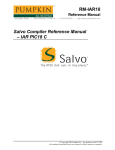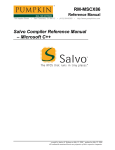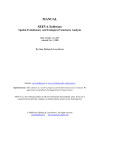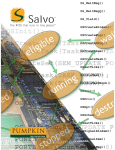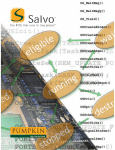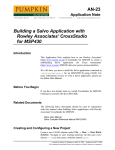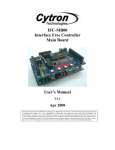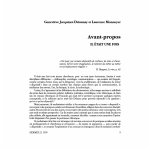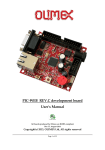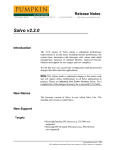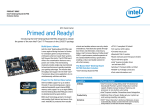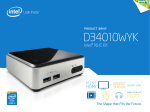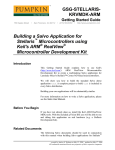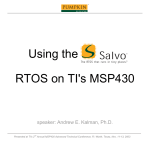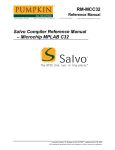Download RM-MCC18 Salvo Compiler Reference Manual
Transcript
RM-MCC18
Reference Manual
750 Naples Street
•
San Francisco, CA 94112
• (415) 584-6360
•
http://www.pumpkininc.com
Salvo Compiler Reference Manual
– Microchip MPLAB-C18
© Copyright 2003 Pumpkin, Inc. last updated on Nov 26, 2007
All trademarks mentioned herein are properties of their respective companies.
Reference Manual
Introduction
This manual is intended for Salvo users who are targeting
Microchip (http://www.microchip.com/) PIC18 PICmicro® MCUs
with Microchip's (http://www.microchip.com/) MPLAB-C18 C
compiler.
Related Documents
The following Salvo documents should be used in conjunction
with this manual when building Salvo applications with
Microchip's MPLAB-C18 C compiler:
Salvo User Manual
Application Note AN-12 (obsolete)
Application Note AN-25
Note MPLAB-C18 users are strongly advised to upgrade to
Microchip's MPLAB IDE v6.30 or later. Use AN-25 in place of
AN-12.
Example Projects
Example Salvo projects for use with Microchip's MPLAB-C18 C
compiler and the Microchip MPLAB IDEs v5 and v6 can be found
in the:
\salvo\ex\ex1\syse
\salvo\tut\tu1\syse
\salvo\tut\tu2\syse
\salvo\tut\tu3\syse
\salvo\tut\tu4\syse
\salvo\tut\tu5\syse
\salvo\tut\tu6\syse
directories of every Salvo for Microchip PICmicro® MCUs
distribution.
Features
Table 1 illustrates important features of Salvo's port to Microchip's
MPLAB-C18 C compiler.
2
RM-MCC18 Salvo Compiler Reference Manual – Microchip MPLAB-C18
Reference Manual
general
Salvo Lite, LE & Pro
for Microchip PICmicro® MCUs
PIC18 PICmicro® MCUs
portmcc.h
portpic18.c
SYSE
available distributions
supported targets
header file(s)
other target-specific file(s)
project subdirectory name(s)
salvocfg.h
compiler auto-detected?
yes
1
libraries
\salvo\lib subdirectory
default storage class
mcc18
auto
context switching
via
OSCtxSw(label)
no
method
_OSLabel() required?
size of auto variables and
function parameters in tasks
unrestricted
memory
small and large
single-bank and multi-bank
memory models supported
stack models supported
interrupts
GIEL and/or GIEH bits. Controlled
via OSPIC18_INTERRUPT_MASK
configuration option
controlled via
interrupt status preserved in
critical sections?
yes
relevant GIE bits are saved to
software stack on entry, interrupts
are disabled, and relevant GIE bits
are restored from software stack on
exit
2
unlimited
3
yes
method used
nesting limit
alternate methods possible?
debugging
source-level debugging?
only in source-code builds
compiler
bitfield packing support?
printf() / %p support?
va_arg() support?
no
no / no
4
yes
Table 1: Features of Salvo Port to Microchip's MPLABC18 C Compiler
RM-MCC18 Salvo Compiler Reference Manual – Microchip MPLAB-C18
3
Reference Manual
Libraries
Nomenclature
The Salvo libraries for Microchip's MPLAB-C18 C compiler
follow the naming convention shown in Figure 1.
sfc18sna.lib
Salvo library
configuration
a: multitasking with delays and events
d: multitasking with delays
e: multitasking with events
m: multitasking only
t: multitasking with delays and events,
tasks can wait with timeouts
type
f: freeware
l: standard
memory type for global Salvo objects
f: far - pointers are 16 bits
n: near - pointers are 8 bits
MPLAB-C18
memory model
l: large (<=2MB address space)
s: small (<=64KB address space)
Figure 1: Salvo Library Nomenclature – Microchip's
MPLAB-C18 C Compiler
Type
Salvo Lite distributions contain freeware libraries. All other Salvo
distributions contain standard libraries. See the Libraries chapter of
the Salvo User Manual for more information on library types.
Target
The PIC18's core architecture5 is consistent throughout the entire
family. Every Salvo library compiled under the small memory
model can be used with any member of the PIC18 family, provided
that the size does not exceed 32K (64KB). Salvo libraries compiled
under the large memory model can be used with any member of
the PIC18 family.
Memory Model
The Microchip MPLAB-C18 C compiler's small and large
memory models are supported. In library builds, the memory
model applied to all of the source files must match that used in the
library. For source-code builds, the same memory model must be
applied to all of the source files.
4
RM-MCC18 Salvo Compiler Reference Manual – Microchip MPLAB-C18
Reference Manual
memory model code
description
Large memory model. Program
space is a maximum of 1M words
(2MB).
Small memory model. Program
space is a maximum of 32K words
(64KB).
l / OSL:
s / OSS:
Table 2: Memory Models for Salvo Libraries –
Microchip's MPLAB-C18 C Compiler
Note Unlike the library configuration and variant options
specified in the salvocfg.h file for a library build, none is
specified for the selected memory model. Therefore particular
attention must be paid to the memory model settings used to build
an application. The memory model is usually specified on a nodeby-node basis inside an IDE (e.g. MPLAB).
Memory Type for Global Salvo Objects
You can choose the memory type for Salvo's global objects in your
application by choosing the appropriate library. near type objects
can be accessed the fastest, but consume precious RAM in the
Access Bank. far type objects will be placed in banked RAM,
which will result in slower accesses. The global object codes are
listed in Table 3.
memory type code
f / OSF:
n / OSN:
description
Salvo objects are declared as type
far, and will be located in banked
RAM.
Salvo objects are declared as type
near, and will be located in the first
128 bytes of internal RAM (i.e. in
access RAM).
Table 3: Memory Types for Salvo Libraries – Microchip's
MPLAB-C18 C Compiler
The code required to access Salvo's global objects (e.g. the task
control blocks, or tcbs) will vary in size and speed depending on
where the objects are located.
Since there are only 128 bytes of access RAM in the PIC18
architecture, in larger applications it may be necessary to place
Salvo's global objects in banked RAM.
RM-MCC18 Salvo Compiler Reference Manual – Microchip MPLAB-C18
5
Reference Manual
Configuration
Different library configurations are provided for different Salvo
distributions and to enable the user to minimize the Salvo kernel's
footprint. See the Libraries chapter of the Salvo User Manual for
more information on library configurations.
Build Settings
Salvo's libraries for Microchip's MPLAB-C18 C compiler are built
using the default settings outlined in the Libraries chapter of the
Salvo User Manual. Target-specific settings and overrides are
listed in Table 4.
compiled limits
max. number of tasks
max. number of events
6
max. number of event flags
max. number of message
7
queues
3
5
1
1
target-specific settings
delay sizes
idling hook
interrupt-enable bits during
critical sections
message pointers
Salvo objects
system tick counter
task priorities
watchdog timer
8 bits
enabled
GIEH = GIEL = 0
can point to ROM or RAM
far
available, 32 bits
enabled
cleared in OSSched().
Table 4: Build Settings and Overrides for Salvo Libraries
for Microchip's MPLAB-C18 C Compiler
Note The compiled limits for tasks, events, etc. in Salvo libraries
can be overridden to be less (all Salvo distributions) or more (all
Salvo distributions except Salvo Lite) than the library default. See
the Libraries chapter of the Salvo User Manual for more
information.
Available Libraries
There are 40 Salvo libraries for Microchip's MPLAB-C18 C
compiler. Each Salvo for Microchip PICmicro® MCUs
distribution contains the Salvo libraries of the lesser distributions
beneath it.
6
RM-MCC18 Salvo Compiler Reference Manual – Microchip MPLAB-C18
Reference Manual
salvocfg.h Examples
Below are examples of salvocfg.h project configuration files for
different Salvo for PICmicro® MCUs distributions targeting the
PIC18C452.
Salvo Lite Library Build
#define
#define
#define
#define
#define
#define
#define
#define
OSUSE_LIBRARY
OSLIBRARY_TYPE
OSLIBRARY_GLOBALS
OSLIBRARY_CONFIG
OSTASKS
OSEVENTS
OSEVENT_FLAGS
OSMESSAGE_QUEUES
TRUE
OSF
OSF
OSA
2
4
0
1
Listing 1: Example salvocfg.h for Library Build Using
sfc18lfa.lib
Salvo LE & Pro Library Build
#define
#define
#define
#define
#define
#define
#define
#define
OSUSE_LIBRARY
OSLIBRARY_TYPE
OSLIBRARY_GLOBALS
OSLIBRARY_CONFIG
OSTASKS
OSEVENTS
OSEVENT_FLAGS
OSMESSAGE_QUEUES
TRUE
OSL
OSF
OSA
7
13
3
2
Listing 2: Example salvocfg.h for Library Build Using
slc18lfa.lib
Salvo Pro Source-Code Build
#define
#define
#define
#define
#define
#define
OSENABLE_IDLING_HOOK
OSENABLE_SEMAPHORES
OSTASKS
OSEVENTS
OSEVENT_FLAGS
OSMESSAGE_QUEUES
TRUE
TRUE
9
17
2
4
Listing 3: Example salvocfg.h for Source-Code Build
RM-MCC18 Salvo Compiler Reference Manual – Microchip MPLAB-C18
7
Reference Manual
Performance
Memory Usage
tutorial memory usage8
tu1lite
tu2lite
tu3lite
tu4lite
tu5lite
tu6lite
tu6pro11
total ROM9
total RAM10
644
976
1026
1914
2708
2988
2770
34
36
38
47
59
62
58
Table 5: ROM and RAM requirements for Salvo
Applications built with Microchip's MPLAB-C18 C
Compiler
Special Considerations
Variables Inside Tasks
Due to architectural limitations of the Salvo context switcher for
Microchip's MPLAB C18 C compiler, auto variables inside tasks
are not supported and will lead to various runtime problems.
Therefore all variables inside tasks should be declared as static
when using Microchip's MPLAB C18 C compiler to build a Salvo
application.
Incompatible Optimizations
The Microchip MPLAB-C18 C compiler's procedural abstraction
optimization is incompatible with Salvo tasks due to its potential
effect on the Salvo context switcher OSCtxSw(). Therefore this
optimization must be explicitly disabled (-Opa-) in any source file
that contains Salvo tasks.12
Note In cases where the effects of procedural optimization are
otherwise beneficial to an application, it is recommended that
source code (*.c) modules be dedicated to holding Salvo tasks and
no other functions. Thus, the scope of disabling the procedural
abstraction optimizations can be limited to just Salvo tasks, thereby
allowing the use of this optimization on other functions where it is
appropriate.
8
RM-MCC18 Salvo Compiler Reference Manual – Microchip MPLAB-C18
Reference Manual
Storage Classes
Microchip's MPLAB-C18 C compiler supports three different
default global storage classes for local variables and function
parameters: auto, static and overlay.13 The storage class for all
modules in a project must match in order to avoid link-time errors.
All of Salvo's libraries are built with the auto default storage class.
Should you wish to build a Salvo application with a different
default storage class, you'll need Salvo Pro to either do a sourcecode build with the alternate default storage class in force, or to
create a custom Salvo library with the alternate default storage
class.14
The different storage classes are set at compile time via the –sca,
-scs and –sco command-line options.
Stack Issues
For architectural reasons, Microchip's MPLAB-C18 C compiler
passes parameters on a software stack, and uses the PIC18's
hardware stack for call…return addresses. While the compiler
supports both reentrant and static overlay models, Salvo's
implementation for this compiler is compatible only with the
reentrant model.
Stack Size
By default, Salvo is configured to work with MPLAB-C18's
software stack of any size, i.e. the single-bank and multi-bank
(-Ls-) stack models. If the single-bank model is used (MPLABC18's default), then Salvo's OSMPLAB_C18_STACK_SIZE can be set
to 256 or less and a minor savings in Salvo code size can be
realized.
Warning If MPLAB-C18's multi-bank stack model is chosen
with Salvo's OSMPLAB_C18_STACK_SIZE set to 256 bytes or less,
errors will occur.
RM-MCC18 Salvo Compiler Reference Manual – Microchip MPLAB-C18
9
Reference Manual
Salvo's Global Objects
Locating Objects in Near/Access or Banked RAM
With Microchip's MPLAB-C18 C compiler, Salvo's global objects
can be located en masse in one of two areas – either in banked
RAM or in access RAM. With OSMPLAB_C18_LOC_ALL_NEAR set
to FALSE (the default), all of Salvo's objects are placed in banked
RAM. To locate all of the objects in access RAM in a Salvo Pro
source-code build, set OSMPLAB_C18_LOC_ALL_NEAR to TRUE.
Note Because of the small size of the PIC18's access RAM,
locating Salvo's global objects in access RAM is rarely
appropriate.
There are no provisions for uniquely placing selected Salvo global
objects in access or banked RAM. Salvo's OSLOC_XYZ
configuration parameters do not apply.
Limits on the Numbers of Tasks, Events, etc.
By default, each of Salvo's larger global objects (e.g. the array of
task control blocks, or tcbs) is placed in its own data section.15
This enables the use of the largest possible array size (256 bytes)
supported by the compiler, and enables the compiler to efficiently
pack all of Salvo's global objects into available RAM.
Note Because of this 256-byte limit on the size of arrays, the
numbers of Salvo tasks, events, message queues, etc, is limited not
by the amount of total RAM on the PIC18 processor, but by the
number of elements that will fit within a 256-byte array (i.e. within
one bank).
For example, the maximum value for OSTASKS is 42 in a Salvo
configuration that supports multitasking and events, because 42
tasks require an array of 0xFC (252) bytes.16 The same application
can also concurrently support up to 51 events.
Interrupt Service Routines
By default, Microchip's MPLAB-C18 C compiler preserves basic
context in ISRs. To properly declare an ISR that calls a Salvo
service, the save= clause of the interrupt pragma should be used
thusly:
10
RM-MCC18 Salvo Compiler Reference Manual – Microchip MPLAB-C18
Reference Manual
#pragma interrupt ISR save=PROD,section(".tmpdata")
void ISR( void )
{
…
OSTimer();
…
}
Note Additional functions in the ISR may require additional
arguments to the save= clause. See the MPLAB-C18 User's Guide
for more information.
Interrupt Control
The PIC18 architecture supports two distinct priority levels. When
enabled, two separate global-interrupt-enable bits, GIEH and GIEL,
are used to control high- and low-priority interrupts, respectively.
Interrupts are automatically disabled within Salvo's critical
sections. By default, both GIEH and GIEL are reset (i.e. made 0)
during critical sections. This is controlled by Salvo's
OSPIC18_INTERRUPT_MASK configuration option (default value:
0xC0).
Salvo Pro users can reconfigure the way in which interrupts are
disabled
during
critical
sections
by
redefining
OSPIC18_INTERRUPT_MASK in the project's salvocfg.h. For
example, if Salvo services (e.g. OSTimer()) are called only from
low-priority interrupts, then a value of 0x40 for
OSPIC18_INTERRUPT_MASK ensures that only low-priority
interrupts are disabled during a Salvo critical section. In this
configuration, high-priority interrupts will therefore be unaffected
by Salvo. This is especially useful when high-rate interrupts are
present.
Note Salvo Pro users have the option of building custom libraries
with interrupt disabling and re-enabling controlled by non-default
values for OSPIC18_INTERRUPT_MASK. See the Salvo User Manual
for more information.
1
This is done automatically through the __18CXX symbol defined by the
compiler.
RM-MCC18 Salvo Compiler Reference Manual – Microchip MPLAB-C18
11
Reference Manual
2
3
4
5
6
7
8
9
10
11
12
13
14
15
16
12
Though the PIC18 architecture has a hardware call…return stack depth
limit of 32 levels.
Via either in-line assembly or a function call.
As of MPLAB-C18 v2.20.
I.e. the non-peripheral SFRs, like TOSU|H|L, STKPTR, PCLATH|L, PCL,
FSR0H|L, etc.
Each event flag has RAM allocated to its own event flag control block.
Each message queue has RAM allocated to its own message queue control
block.
Salvo v3.2.1 with MPLAB-C18 v2.2x.
In program addresses (words).
In bytes, all banks, udata. Does not include stack (default: 0x100 bytes).
Salvo global objects are in banked RAM (far).
Salvo Pro build differs slightly from Salvo Lite build due to configuration –
see tutorial's salvocfg.h.
By default, all of MPLAB-C18's optimizations are enabled.
overlay applies only to local variables, not function parameters.
Note that this may require changes to Salvo's makefile system, since an
additional command-line argument will need to be passed to the compiler.
As of Salvo v3.2.4.
E.g. with an e-configuration library.
RM-MCC18 Salvo Compiler Reference Manual – Microchip MPLAB-C18













